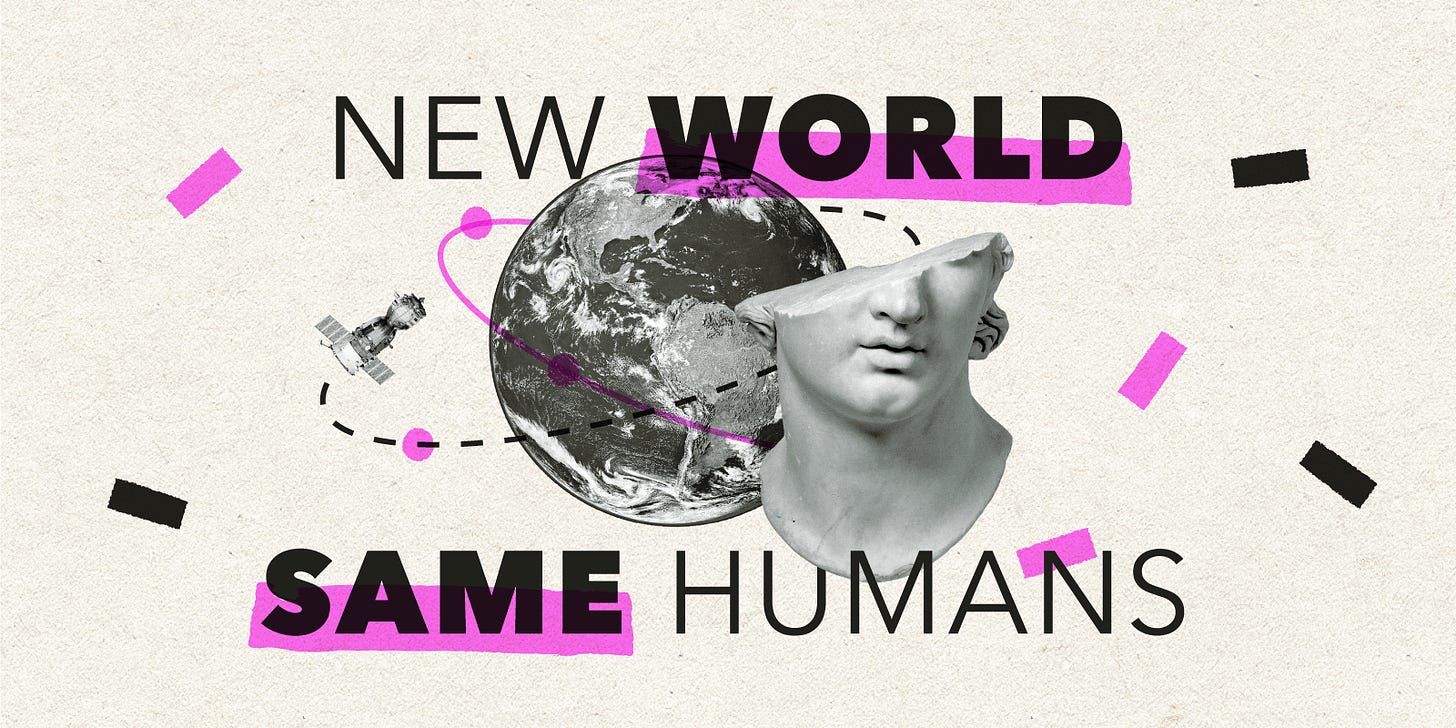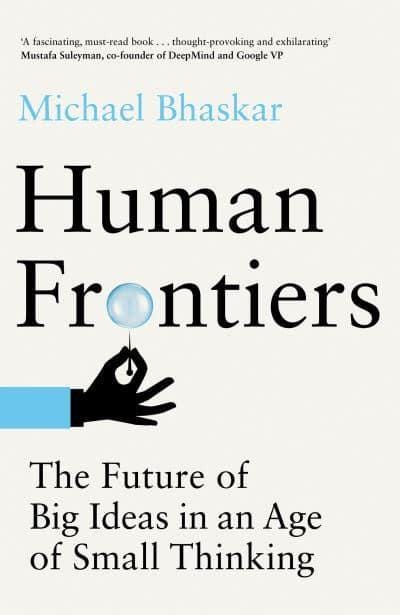Here Comes the Great Acceleration
Have we hit the limits of human knowledge? A guest post by NWSH reader Michael Bhaskar.
Welcome to New World Same Humans, a weekly newsletter on trends, technology, and society by David Mattin.
If you’re reading this and you haven’t yet subscribed, join 18,000+ curious souls on a mission to build a better shared future 🚀🔮
This week’s instalment is special: it’s the first ever NWSH expert guest post.
I want to make these instalments a regular fixture. They’ll bring a new diversity of thought to the newsletter, and they’re a chance for us all to hear from some of the amazing people – technologists, designers, writers, policy makers and more – inside our community.
This week’s post is from NWSH reader Michael Bhaskar. Michael is the co-founder of the London-based publishing company Canelo. He’s also an independent researcher, and a former writer-in-residence at DeepMind.
Michael has just published a book called Human Frontiers: The Future of Big Ideas in an Age of Small Thinking. It takes aim at the Great Stagnation, and asks: have big ideas, profound social and economic change, and transformative innovations disappeared? What might it take to bring them back?
The book is a brilliant tour through the underlying causes of our apparent stasis. And it offers a compelling new argument on what lies ahead. When I saw the proofs, I immediately knew that Michael should be our first guest contributor.
That’s more than enough from me; here is Michael’s short essay. And to get hold of a copy of Human Frontiers, see the end of this email.
In search of the Great Acceleration
I first started thinking about the ideas at the heart of my new book when on a consultancy project at DeepMind.
The company is a great example of an organisation pushing hard at the technology and knowledge frontiers. But how many other examples are there? What goes into a push like that? What does it take to deliver a big idea like Artificial General Intelligence, and how good is our society at doing equivalents?
Before long I began exploring the discourse around the Great Stagnation: the argument that far from accelerating into a glorious future we are, in many respects, stuck. At first sight this concept appears counter-intuitive. Surely we live in an age of rapid progress across all measures? Open a copy of Wired, Nature, or for that matter a NWSH newsletter, and you’re treated to a parade of wonders. But a surprising group of diverse thinkers and researchers coming from across the spectrum – from anthropologists to entrepreneurs, libertarian tech entrepreneurs to socialist cultural commentators – makes a persuasive case that, at the frontiers of human endeavour, the recent record looks shaky.
David covers the core case for the Great Stagnation in The Future that Never Came: long-term growth rates and, even more, long-term productivity growth – a core measure of the impact of new technology – are both well down on their mid 20th-century highs. Patent quality is not improving. New patent class creation, a way of capturing disruptive new technologies, is at best flat despite greatly increasing R&D.
This pattern of diminishing returns on ideas is widespread: one famous paper estimates that research productivity is in an entrenched decline dating back at least half a century. Ideas today cost much more; they are getting harder. Another well-known paper argues that delivery of major innovations, whether adjusted by population, education or GDP, peaked in the late 19th-century. This isn’t just about flying cars and their absence, although that may be telling; it’s a broader story of struggle.
But this phenomenon also goes far beyond just economic concerns or technology. Science exhibits a similar pattern: many more papers published, but few paradigm shifting ideas introduced. Arts and culture seem to be stuck in a pattern of recycling while political, ideological and policy ideas are endlessly rehashed and reheated; Fukuyama had a point. The days when novelists or philosophers could revolutionize their fields with a great book are gone.
In Human Frontiers I wanted to look at the argument for stagnation, but not only that. The really important thing is what happens next. If we are in a Great Stagnation, how do we overcome it?
*
The reasons it has become more difficult to generate Big Ideas are complex and hard to summarise; I recommend reading the book! But they can broadly be divided into two.
First comes our position in the history of ideas. Partly this is about the low-hanging fruit phenomenon; the notion that easier ideas have, bluntly, been used up. Once someone has proposed natural selection, cubist painting or an algorithm like PageRank, the idea has been taken. You can refine it, but the most significant hit has already been delivered. But a host of other effects also come into play. As existing knowledge and work piles up, the knowledge frontier is always getting further away. That means we require more study/people/resource to reach the frontier: a phenomenon known as the burden of knowledge effect. The complexity of the world is remorselessly increasing. If there are limits, both hard but also perhaps subjective, we are always getting nearer.
Second, despite our much vaunted capacity for innovation, society has clamped down on the messy, risky, long work that usually goes into doing something radically new. Outside a few tech companies, the freewheeling R&D labs have closed; short-termism is rampant and investment in anything risky is rare, despite the great private accumulations of capital. Academia is clogged with credentialism, metric-chasing, precarity and bureaucracy. No one I spoke to felt anything other than despair at the way the modern university system stifles free thinking and high-risk work. We live in an age when experts can be ridiculed, populisms of the left and right run rampant, free speech is under assault from all sides, when the need for the quick press release or another hit on the like button takes precedence. A nexus of pressures weighs down on big ideas, nudging us towards a cautious, complacent incrementalism.
So, given these circumstances, what comes next? Can we escape the Great Stagnation?
I’m fairly optimistic, with major caveats. That’s because working against the two forces of stagnation I outlined above are two epic megatrends. They are the rise of a new toolkit, with AI in the vanguard. And a historical first: a time when all the great civilizations of the world are converging on the knowledge and technology frontiers.
The toolkit is led by AI. Look at what DeepMind has done with one of the central challenges of modern biology: the protein folding problem. This 50 year challenge was effectively solved by deployment of cutting edge machine learning.
Just as a new toolkit sparked both the Reformation and the Scientific Revolution, I believe something similar is happening today with a suite of emergent, unfinished but extraordinary tools. Build these – from quantum computers to synthetic biology – and they will be the calculus, printing press and telescope of the 21st-century; catalysts for the biggest ideas in history.
To get there, though, will require a completely new phase in history; one when everyone can contribute. And via the convergence of many civilizations on the knowledge and technology frontiers, we’re starting to see the emergence of this. More on that in Human Frontiers.
The Great Acceleration may be delayed, but perhaps not forever.
Accelerate This
Thanks for reading this week. And a huge thanks to Michael Bhaskar for the guest post.
To dive deeper into Michael’s thinking, get your hands on a copy of the brilliant Human Frontiers.
And if you’re working on a project that would make for a great short post to share with our community, just drop me a line.
I’ll be back on Wednesday as usual. Until then, be well,
David.




